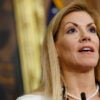On Saturday, President Obama used his weekly radio address to call for the quick reauthorization of No Child Left Behind (NCLB). Obama lauded the progress of Booker T. Washington High School in Memphis, Tennessee—his inaugural Race to the Top Commencement Address winner—and showcased the low-income school as an example of how to reverse course and get positive results:
We need to encourage this kind of change all across America. We need to reward the reforms that are driven not by Washington, but by principals and teachers and parents. That’s how we’ll make progress in education—not from the top down, but from the bottom-up.… That’s why it’s so important to replace No Child Left Behind this year—so schools have that flexibility.
But despite promoting a bottom-up approach to improving America’s schools, President Obama’s language suggests that the same Washington-centric policies can be expected moving forward. When the President says, “We need to encourage this type of change,” we likely means himself, Secretary Duncan, and certain Members of Congress.
And if history is any guide, the President’s assurances that reform will not be driven by Washington should be taken with a large grain of salt. His Administration has already gifted a $100 billion bonus to the Department of Education and created the framework for federally backed national standards and tests. President Obama would have to do a policy 180 to overhaul the nation’s largest education law in a way that empowers local leaders and parents as opposed to Washington bureaucrats.
Every reauthorization of NCLB since 1965 has added a litany of niche programs (with the exception of the most recent reauthorization in 2001, which attempted to reduce program growth) that have failed to improve student outcomes. While President Obama wants a rewritten NCLB “before the next school year begins,” conservatives in Congress want to end the practice of trying to reform the nation’s schools from Washington.
To that end, Elementary and Secondary Education subcommittee chairman Duncan Hunter has introduced a bill to eliminate 43 (out of approximately 80) programs under NCLB in an attempt to streamline the Department of Education and better target resources. This morning on Bill Bennett’s Morning in America radio program, House Education and the Workforce Committee chairman John Kline championed Hunter’s Setting New Priorities in Education Spending Act:
There are some 80 individual programs inside the Elementary and Secondary Education Act and we have a bill to eliminate 43 of those. It’s just too complicated, it’s difficult to deal with, it’s indication that we’ve got programs that somebody thought was a great idea at one time and they just don’t go away. So we waste money, we waste energy, we need to get more streamlined, more efficient, more effective and start pulling the federal government progressively out of running education.
During the past half-century, Americans have seen eight reauthorizations of the Elementary and Secondary Education Act—now known as No Child Left Behind. Yet student achievement languishes, our international competitiveness is stagnant, and achievement gaps stubbornly persist. Albert Einstein famously defined insanity as doing the same thing over and over again and expecting different results. A ninth reauthorization of NCLB—and an expectation that this time Congress will get it right—would be folly.
In an attempt to stop the madness, conservatives in Congress have decided to try a new approach, which includes stopping the education spending spree, eliminating duplicative and ineffective programs, and empowering state and local leaders.































3 Replies to “A Smart Move to Education Reform: Downsize the Federal Footprint”